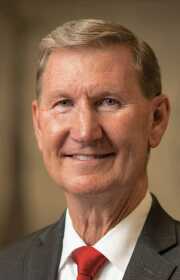University leaning in on stateís economic development

This spring we celebrated 7,200 new graduates of the University of Nebraska Ė new Husker, Maverick, Loper and UNMC alumni who are future leaders of our state.
Itís one of my favorite times of year. Commencement brings to life the fundamental reason why public higher education exists: To create opportunities for students to build a better future for themselves and the world around them.
Each graduating class of the University of Nebraska transforms our state in ways that are impossible to quantify. These students go on to become the next generation of teachers, health care professionals, agricultural leaders, entrepreneurs and engineers. They not only fill todayís job openings, they create jobs that donít even exist yet Ė high-skill, high-wage positions that propel Nebraska forward.
They grow our tax base, injecting millions into the economy every year. College graduates contribute to strong communities through high rates of volunteering and public service.
And University of Nebraska graduates, having learned from the best in their fields in classrooms and labs across our campuses, are uniquely positioned to solve some of the biggest challenges of our time: treating cancer and other devastating diseases, producing enough food to feed the world, protecting our national security.
No other entity, in fact, impacts Nebraskaís economy and workforce quite like the University of Nebraska. With more than 50,000 students, world-class faculty and a vibrant research enterprise that affects everything from the food you eat to the health care you receive, the scope and scale of the universityís work is significant and far-reaching.
While the chancellors and I are immensely proud of the universityís impact on Nebraskaís economic development, we also know we canít simply keep doing ďbusiness as usual.Ē
Itís time to do more Ė create more opportunities for students, form more partnerships with local businesses, offer more internships that will lead to great-paying jobs right here in the state.
Nebraskaís workforce needs are too urgent for its public university not to be leaning in aggressively on economic development. In survey after survey, the clarion call from business leaders is that workforce is their No. 1 challenge. We can all be proud that Nebraskaís economy has been more resilient than most through Covid-19, but to truly grow and compete, we need more workforce.
That includes college graduates who can fill crucial shortages in fields like healthcare, IT and teaching. And it will require us to retain talented Nebraskans as well as make our state the destination of choice for people looking for a great place to live, work and raise their families.
Our challenge is clear, but Nebraskans know what it means to have a bias for action. As a university, we understand the time to act is now.
Thatís why, as we began updating the University of Nebraska Systemís strategic plan, one the first items on our list was a goal for every University of Nebraska student to have an internship or other experiential learning opportunity.
Itís why weíve launched new programs like UNOís Career Connect, a collaboration with local businesses to provide unprecedented access to paid internships for UNO students. Itís why UNLís Institute for Agriculture and Natural Resources just sent 26 students across the state for 10-week internships focused on rural community growth. Itís why UNK has formed a new partnership with Central Community College ensuring a seamless transition from an associateís degree to a bachelorís degree for students in a variety of business fields.
Itís why weíre exploring new strategies to make it easier for working professionals to earn credentials that can advance their careers, and to help the 300,000-plus Nebraskans who have earned some college credits complete their degree. And itís why we are joining with elected leaders and education colleagues in pursuit of a bold new goal for 70 percent of 25- to 34-year-old Nebraskans to hold post-secondary credentials.
None of us can do this alone, after all. Workforce development is a statewide challenge Ė and a national competition. With our shared bold vision for economic growth, I believe Nebraskans will compete to win.
